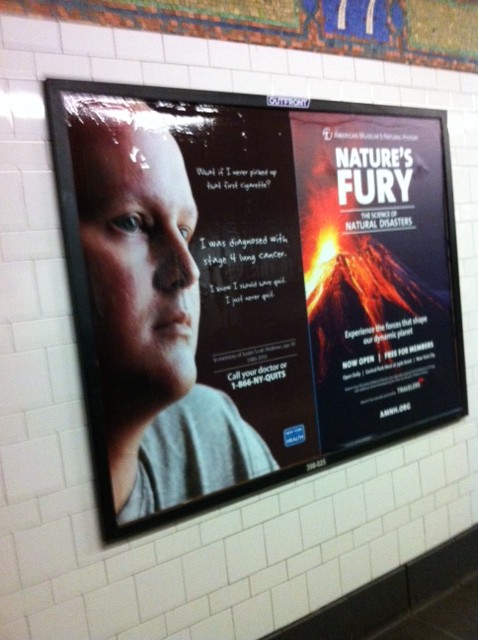Little did I dream while riding on the back of a black Triumph motorcycle in Paris that several decades later I would be invited to picture myself perched on the back of a motorcycle for geezers, carrying the flag for cancer research, on our way to go fishing. (Fishing?!) NB: I imagine myself on the back seat since I don’t drive a car, or ride a bike, never mind a motorcycle. And maybe the “I” in the drug company ad is the guy in the driver’s seat. Gender identity here is not the problem.
 “My Cancer May Have a Powerful Enemy: Me.” The phrase neatly combines the persistent metaphor of cancer as a battle with the familiar American narcissism of a can-do self. It’s all about me, myself, and I.
“My Cancer May Have a Powerful Enemy: Me.” The phrase neatly combines the persistent metaphor of cancer as a battle with the familiar American narcissism of a can-do self. It’s all about me, myself, and I.
“The power to fight cancer may already be in you.” True, but even truer, the beginnings of cancer may already be in you. One of the weirder things about the disease is that it takes root long before it expresses itself, sometimes years. When you get your diagnosis, many of us ask―I did―how long have I had it? Since it’s very hard to shake the notion that we have been harboring a criminal, indeed are somehow criminals ourselves, a cancer diagnosis often causes a guilty look backwards over our lives. Wow, all that time I had cancer.
The notion that you are responsible for healing from your disease reinforces the notion that you are responsible for having the disease in the first place: You gave yourself cancer, now take it away.
When you read the ad’s text, you see that this research in immune-oncology (already branded with an acronym I-O) is in fact more modest in aim than the drama of the blue-sky banner might suggest. It’s all about the future. The “industry” (at least big Pharma names itself correctly) is looking for ways to “offer renewed hope” (assuming you had any left or any in the first place) and the “potential of a longer life to patients with advanced cancer.” If you read the statistics on survival published by drug companies, you’ll see that “longer life” might mean a couple of months in god knows what condition (not their problem).
 I came upon a much more realistic view of cancer on a subway platform poster, represented by what appears to be a teen-age boy meditating on his brief life:
“I was diagnosed with stage 4 lung cancer. I know I should have quit. I just never did.” Of course, that brings back the victim blaming rhetoric, especially associated with lung cancer and smoking (of course it’s important to quit as soon as possible). But at least the ad gives face to the pain of illness.
I came upon a much more realistic view of cancer on a subway platform poster, represented by what appears to be a teen-age boy meditating on his brief life:
“I was diagnosed with stage 4 lung cancer. I know I should have quit. I just never did.” Of course, that brings back the victim blaming rhetoric, especially associated with lung cancer and smoking (of course it’s important to quit as soon as possible). But at least the ad gives face to the pain of illness.
Whatever else it may be, cancer is not a cause for celebration.
